一般现在时句型转换练习(对主语提问居多)
- 格式:doc
- 大小:78.50 KB
- 文档页数:2
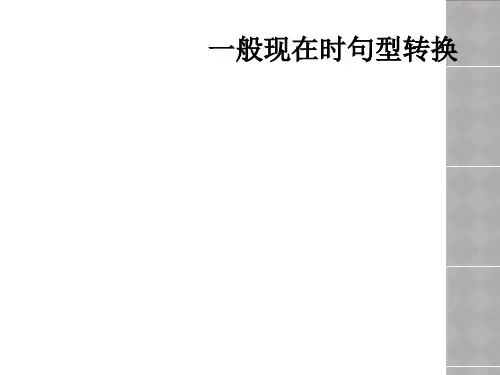
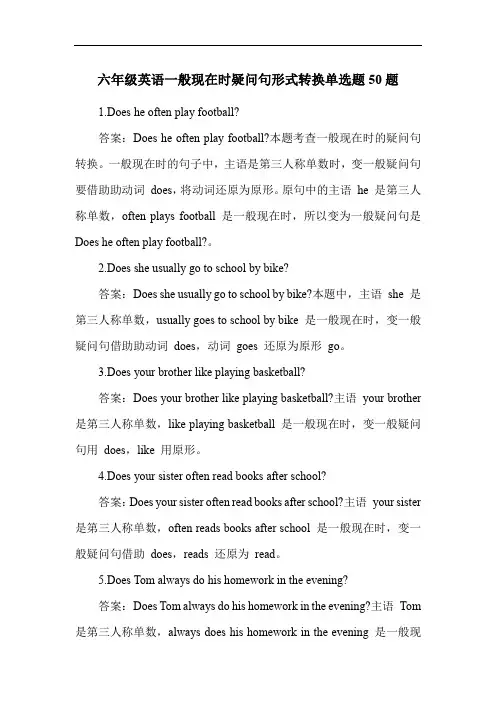
六年级英语一般现在时疑问句形式转换单选题50题1.Does he often play football?答案:Does he often play football?本题考查一般现在时的疑问句转换。
一般现在时的句子中,主语是第三人称单数时,变一般疑问句要借助助动词does,将动词还原为原形。
原句中的主语he 是第三人称单数,often plays football 是一般现在时,所以变为一般疑问句是Does he often play football?。
2.Does she usually go to school by bike?答案:Does she usually go to school by bike?本题中,主语she 是第三人称单数,usually goes to school by bike 是一般现在时,变一般疑问句借助助动词does,动词goes 还原为原形go。
3.Does your brother like playing basketball?答案:Does your brother like playing basketball?主语your brother 是第三人称单数,like playing basketball 是一般现在时,变一般疑问句用does,like 用原形。
4.Does your sister often read books after school?答案:Does your sister often read books after school?主语your sister 是第三人称单数,often reads books after school 是一般现在时,变一般疑问句借助does,reads 还原为read。
5.Does Tom always do his homework in the evening?答案:Does Tom always do his homework in the evening?主语Tom 是第三人称单数,always does his homework in the evening 是一般现在时,变一般疑问句用does,does 还原为do。
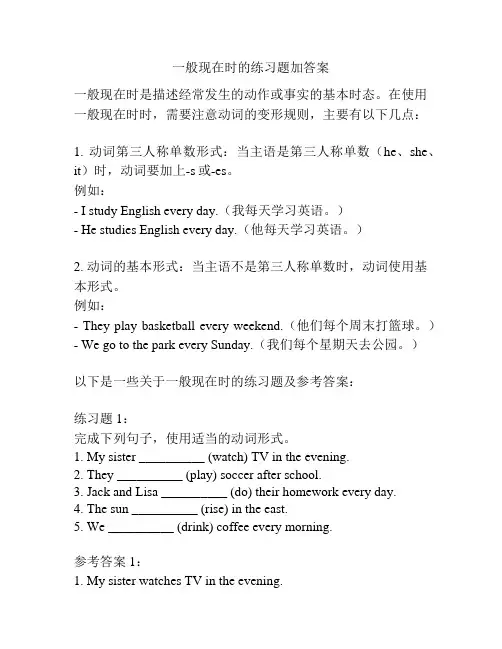
一般现在时的练习题加答案一般现在时是描述经常发生的动作或事实的基本时态。
在使用一般现在时时,需要注意动词的变形规则,主要有以下几点:1. 动词第三人称单数形式:当主语是第三人称单数(he、she、it)时,动词要加上-s或-es。
例如:- I study English every day.(我每天学习英语。
)- He studies English every day.(他每天学习英语。
)2. 动词的基本形式:当主语不是第三人称单数时,动词使用基本形式。
例如:- They play basketball every weekend.(他们每个周末打篮球。
)- We go to the park every Sunday.(我们每个星期天去公园。
)以下是一些关于一般现在时的练习题及参考答案:练习题1:完成下列句子,使用适当的动词形式。
1. My sister __________ (watch) TV in the evening.2. They __________ (play) soccer after school.3. Jack and Lisa __________ (do) their homework every day.4. The sun __________ (rise) in the east.5. We __________ (drink) coffee every morning.参考答案1:1. My sister watches TV in the evening.2. They play soccer after school.3. Jack and Lisa do their homework every day.4. The sun rises in the east.5. We drink coffee every morning.练习题2:选择适当的动词形式填空。
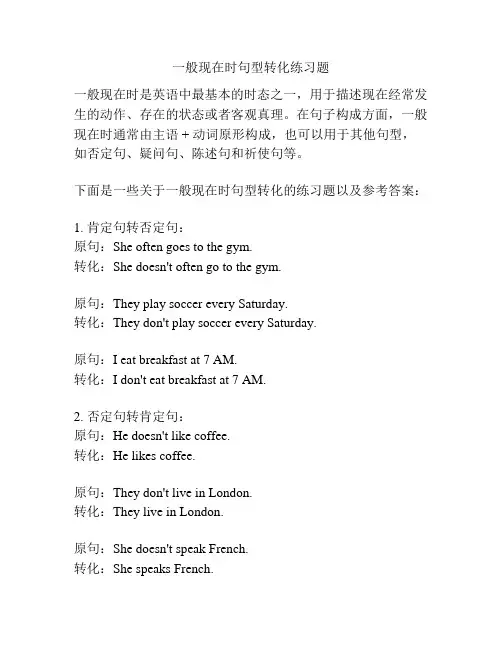
一般现在时句型转化练习题一般现在时是英语中最基本的时态之一,用于描述现在经常发生的动作、存在的状态或者客观真理。
在句子构成方面,一般现在时通常由主语 + 动词原形构成,也可以用于其他句型,如否定句、疑问句、陈述句和祈使句等。
下面是一些关于一般现在时句型转化的练习题以及参考答案:1. 肯定句转否定句:原句:She often goes to the gym.转化:She doesn't often go to the gym.原句:They play soccer every Saturday.转化:They don't play soccer every Saturday.原句:I eat breakfast at 7 AM.转化:I don't eat breakfast at 7 AM.2. 否定句转肯定句:原句:He doesn't like coffee.转化:He likes coffee.原句:They don't live in London.转化:They live in London.原句:She doesn't speak French.转化:She speaks French.3. 一般疑问句转陈述句:原句:Do they study English every day? 转化:They study English every day.原句:Does he play the guitar?转化:He plays the guitar.原句:Does she work on weekends?转化:She works on weekends.4. 陈述句转一般疑问句:原句:They live in New York.转化:Do they live in New York?原句:He speaks Spanish.转化:Does he speak Spanish?原句:She likes to read.转化:Does she like to read?5. 一般现在时转进行时:原句:She plays soccer every Sunday.转化:She is playing soccer this Sunday.原句:I drink coffee in the morning.转化:I am drinking coffee this morning.原句:They watch TV in the evenings.转化:They are watching TV this evening.6. 陈述句转祈使句:原句:They listen to the teacher in class.转化:Listen to the teacher in class.原句:She goes home after work.转化:Go home after work.原句:He studies for exams every night.转化:Study for exams every night.以上是一些关于一般现在时句型转化的练习题和参考答案。
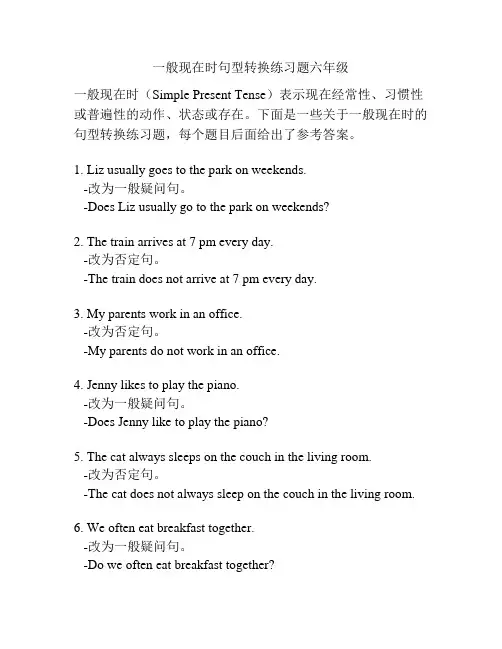
一般现在时句型转换练习题六年级一般现在时(Simple Present Tense)表示现在经常性、习惯性或普遍性的动作、状态或存在。
下面是一些关于一般现在时的句型转换练习题,每个题目后面给出了参考答案。
1. Liz usually goes to the park on weekends.-改为一般疑问句。
-Does Liz usually go to the park on weekends?2. The train arrives at 7 pm every day.-改为否定句。
-The train does not arrive at 7 pm every day.3. My parents work in an office.-改为否定句。
-My parents do not work in an office.4. Jenny likes to play the piano.-改为一般疑问句。
-Does Jenny like to play the piano?5. The cat always sleeps on the couch in the living room.-改为否定句。
-The cat does not always sleep on the couch in the living room.6. We often eat breakfast together.-改为一般疑问句。
-Do we often eat breakfast together?7. Helen usually walks to school.-改为否定句。
-Helen does not usually walk to school.8. Tom and Jerry watch cartoons every morning.-改为一般疑问句。
-Do Tom and Jerry watch cartoons every morning?9. The teacher teaches English and Math.-改为否定句。
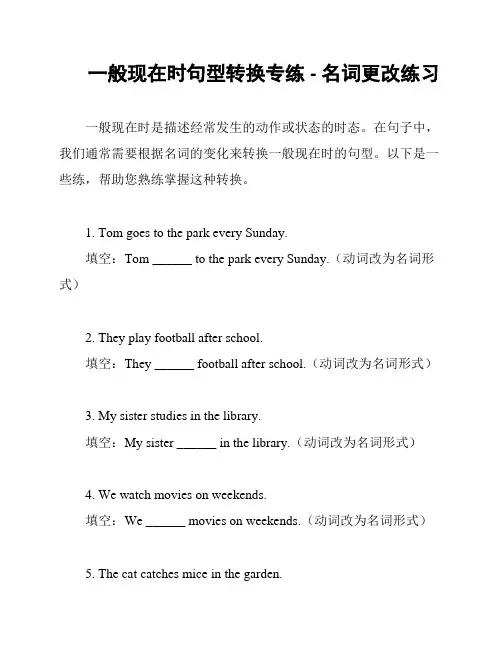
一般现在时句型转换专练 - 名词更改练习一般现在时是描述经常发生的动作或状态的时态。
在句子中,我们通常需要根据名词的变化来转换一般现在时的句型。
以下是一些练,帮助您熟练掌握这种转换。
1. Tom goes to the park every Sunday.填空:Tom ______ to the park every Sunday.(动词改为名词形式)2. They play football after school.填空:They ______ football after school.(动词改为名词形式)3. My sister studies in the library.填空:My sister ______ in the library.(动词改为名词形式)4. We watch movies on weekends.填空:We ______ movies on weekends.(动词改为名词形式)5. The cat catches mice in the garden.填空:The cat ______ mice in the garden.(动词改为名词形式)6. John and Mary go shopping on Saturdays.填空:John and Mary ______ shopping on Saturdays.(动词改为名词形式)7. The students study English in the classroom.填空:The students ______ English in the classroom.(动词改为名词形式)8. She eats breakfast at home.填空:She ______ breakfast at home.(动词改为名词形式)9. He teaches math in the school.填空:He ______ math in the school.(动词改为名词形式)10. I play the piano in the evening.填空:I ______ the piano in the evening.(动词改为名词形式)请根据上述句子的要求,填写相应的名词形式并核对答案。
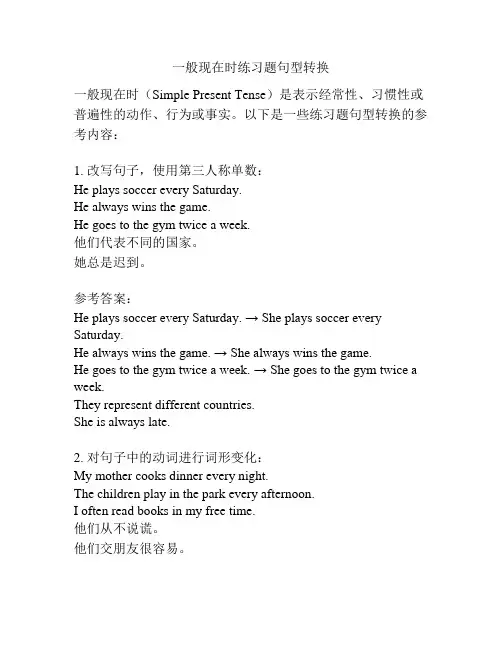
一般现在时练习题句型转换一般现在时(Simple Present Tense)是表示经常性、习惯性或普遍性的动作、行为或事实。
以下是一些练习题句型转换的参考内容:1. 改写句子,使用第三人称单数:He plays soccer every Saturday.He always wins the game.He goes to the gym twice a week.他们代表不同的国家。
她总是迟到。
参考答案:He plays soccer every Saturday. → She plays soccer every Saturday.He always wins the game. → She always wins the game.He goes to the gym twice a week. → She goes to the gym twice a week.They represent different countries.She is always late.2. 对句子中的动词进行词形变化:My mother cooks dinner every night.The children play in the park every afternoon.I often read books in my free time.他们从不说谎。
他们交朋友很容易。
参考答案:My mother cooks dinner every night. → My mother is cooking dinner every night.The children play in the park every afternoon. → The children are playing in the park every afternoon.I often read books in my free time. → I am often reading books in my free time.They never tell lies.They make friends easily.3. 完成否定句和疑问句的转换:I eat lunch at home.She watches TV every evening.They usually go to bed early.Peter plays guitar in the band.她帮助我学习英语吗?参考答案:I do not eat lunch at home. / I don't eat lunch at home.Does she watch TV every evening?They do not usually go to bed early. / They don't usually go to bed early.Peter does not play guitar in the band. / Peter doesn't play guitar in the band.Does she help me study English?4. 使用频率副词改写句子:I often visit my grandparents.She rarely eats fast food.They sometimes travel abroad.我们从不喝咖啡。
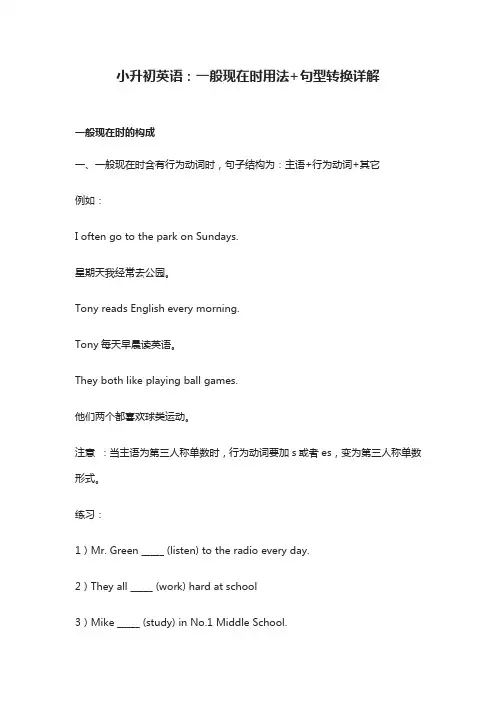
小升初英语:一般现在时用法+句型转换详解一般现在时的构成一、一般现在时含有行为动词时,句子结构为:主语+行为动词+其它例如:I often go to the park on Sundays.星期天我经常去公园。
Tony reads English every morning.Tony每天早晨读英语。
They both like playing ball games.他们两个都喜欢球类运动。
注意:当主语为第三人称单数时,行为动词要加s或者es,变为第三人称单数形式。
练习:1)Mr. Green _____ (listen) to the radio every day.2)They all _____ (work) hard at school3)Mike _____ (study) in No.1 Middle School.二、含有系动词的一般现在时(1).含有be动词的一般现在时,句子结构为::主语+ be+表语+其它例如My name is Lily.我的名字是李莉。
I am from Guanzhou.我来自广州。
We are good friends.我们是好朋友be动词的变化: am is arebe动词用法口诀:我(I)用am你(you)用are,is永远跟着他(he)【它(it)、她(she)】,复数后面都是are。
练习:用be的正确形式填空1、I _____ an English girl.2、She _____ tall.3、Lucy and Lily _____ sisters.(2)系动词为感官动词,句子结构为::主语+感官动词+表语常用的感官动词有:look 看起来; taste 尝起来; smell 闻起来sound 听起来; feel 感觉起来;例如:He looks happy.他看起来很关高兴。
The dishes taste delicious .菜尝起来很美味。
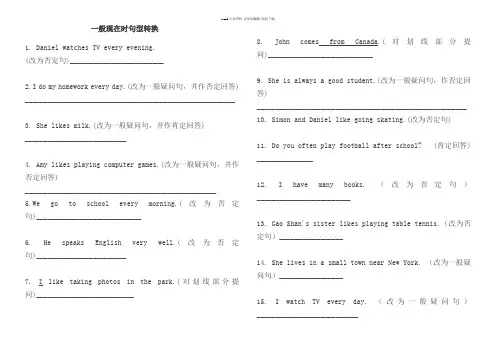
一般现在时句型转换1.Daniel watches TV every evening.(改为否定句)_________________________2.I do my homework every day.(改为一般疑问句,并作否定回答) ________________________________________________________3. She likes milk.(改为一般疑问句,并作肯定回答)___________________________4. Amy likes playing computer games.(改为一般疑问句,并作否定回答)___________________________________________________5.We go to school every morning.(改为否定句)____________________________6. He speaks English very well.(改为否定句)________________________7. I like taking photos in the park.(对划线部分提问)__________________________ 8. John comes from Canada.(对划线部分提问)____________________________9. She is always a good student.(改为一般疑问句,作否定回答)________________________________________________________ 10. Simon and Daniel like going skating.(改为否定句)11. Do you often play football after school? (肯定回答) _______________12. I have many books. (改为否定句)_________________________13. Gao Shan's sister likes playing table tennis.(改为否定句)_________________14. She lives in a small town near New York. (改为一般疑问句)_________________15. I watch TV every day. (改为一般疑问句)___________________________16. David has got a goal. (改为一般疑问句)_________________________17. We have four lessons.(改为否定句)____________________________18. Nancy doesn't run fast. (改为肯定句)_________________________19. My dog runs fast. 否定句:______________一般疑问句:________________20. Mike has two letters for him.一般疑问句:_______________ 否定句:________21. I usually play football on Friday afternoon.否定句: ________________ 一般疑问句: _____________划线提问____________________22. Sun Yang usually washes some clothes on Saturday. 否定句: _____________ 一般疑问句: ________________划线提问: ____________23. Mingming usually waters the flowers every day. 否定句: ________________ 一般疑问句: _____________划线提问 _____________24. Tom does his homework at home.否定句: ______________ 一般疑问句: ____________划线提问_____________。
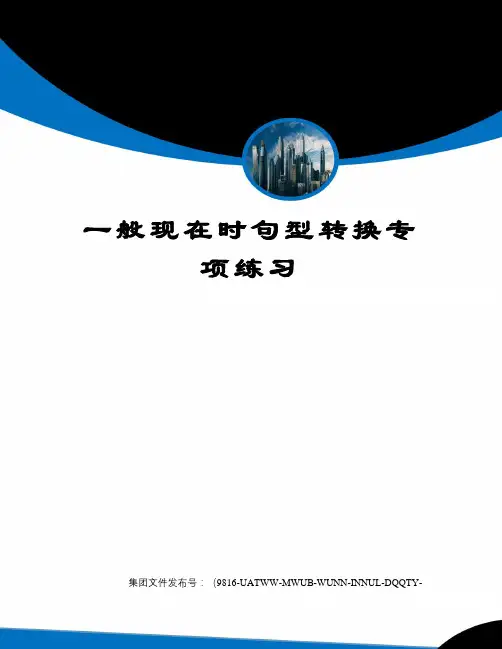
一般现在时句型转换专项练习集团文件发布号:(9816-UATWW-MWUB-WUNN-INNUL-DQQTY-一般现在时专项练习一、选择( ) 1. I _________a nice pen.A. haveB. hasC. doesn’t has ( ) 2. She ________ some picture books.A. haveB. hasC. are( ) 3. Li Ming’s mother _________ any eggs.A. haveB. don’t haveC. doesn’t have( ) 4. ________his father _______ milk for breakfast?A. Does…haveB. Do…hasC. Does…has( ) 5. _________they_______ train tickets?A. Does…haveB. Do…haveC. Does…has( ) 6. Mary _______a big bedroom.A. haveB. don’t haveC. doesn’t have ( ) 7. ________Jenny and Danny have two suitcases Yes, they ________.A. Does…doB. Do…doC. Do…does( ) 8. ________ her father________ two sistersNo.A. Do…hasB. Does…hasC. Does…have( ) 9. The dog _______ some meat.A. hasB. don’t hav eC. doesn’t has( ) 10. The students of Class One ________a football.A. haveB. don’t hasC. doesn’t have( ) 11. I ________to read English books. A. likes B. don’t likes C. like( ) 12. They _______ to school on foot. A. go B. goes C. gos( ) 13. He _______to play with his balls. A. likes B. doesn’t likes C. like( ) 14. His father _________to work by bus.A. don’t goB. doesn’t goesC. doesn’t go( ) 15. Mrs. Li and Kitty _______in a big shop.A. don’t worksB. don’t wo rkC. doesn’t work( ) 16. —_____ you ride a bike to school—Yes, I ________.A. Do…doesB. Does…doesC. Do…do( ) 17. --______ your sister like PE--No, she ______ not.A. Do…doB. Does…doesC. Do…does( ) 18. ________he _______to school every dayNo.A. Does…goB. Do…goC. Does…goes( ) 19. We _________our homework after school. A. does B. do C. dos( ) 20. He ______ not speak English. He speaks Chinese.A. doB. doesC. dos( ) 21. ______ they watch TV on SundaysYes, they ______.A. Do…doB. Does…doesC. Do…does二、把下列肯定句变为否定句。
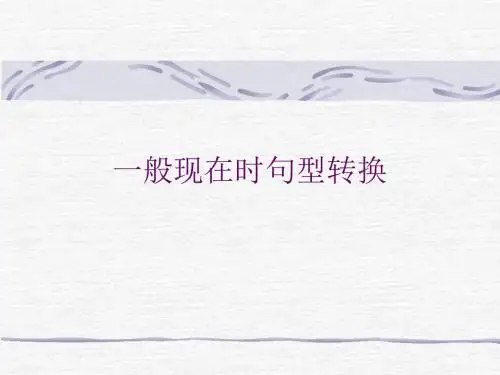
一般现在时:真理/特点/规律①Be动词:am/is/are肯定句:主语+am/is/are+其他.否定句:主语+am/is/are not+其他.一般疑问句:Is/Are +主语+其他?肯定回答:Yes,主语(代词)+is/are.否定回答:No,主语(代词)+is/are+not.1.They are my good friends.否定句:一般疑问句:肯定回答:否定回答:2.He is good at English and Chinese.否定句:一般疑问句:肯定回答:否定回答:3.I am a scientist.否定句:一般疑问句:肯定回答:否定回答:4.Are they your brothers?肯定回答:否定回答:肯定句:否定句:1.Answers:否定句: They aren’t my good friends.一般疑问句:Are they your good friends?肯定回答:Yes, they are.否定回答:No,they aren’t.2.Answers:否定句: He isn’t good at English and Chinese.一般疑问句:Is he good at English and Chinese?肯定回答:Yes, he is.否定回答:No, he isn’t.3.Answers:否定句: I am not a scientist.一般疑问句:Are you a scientist?肯定回答:Yes, I am.否定回答:No, I am not.4.Answers:肯定回答:Yes,they are.否定回答:No,they aren’t.肯定句:They are my brothers.否定句:They aren’t my brothers.②行为动词:V(动词原形表示复数)/ V-s/es(表示单数)肯定句:主语+V/V-s/es+其他.否定句:主语+don’t/doesn’t +V(动词原形)+其他.一般疑问句:Do/Does +主语+V(动词原形)其他?肯定回答:Yes,主语(代词)+do/does.否定回答:No,主语(代词)+do/does+not.动词变单数的规则:1.+s2.s,x,ch,sh,o结尾,+es3.辅音字母+y结尾,去y为i,+es4.元音字母+y结尾,+s5.特殊情况:have-has1.Mike does his homework every day.否定句:一般疑问句:肯定回答:否定回答:特殊疑问句:2.My grandma watches TV in the evening.否定句:一般疑问句:肯定回答:否定回答:特殊疑问句:3.Mary and I have dinner in the restaurant.否定句:一般疑问句:肯定回答:否定回答:特殊疑问句:4.Does your penfriend live in Beijing?肯定回答:否定回答:肯定句:否定句:1.Answers:否定句:Mike doesn’t do his homework every day.一般疑问句:Does Mike do his homework every day?肯定回答:Yes,he does.否定回答:No ,he doesn’t.特殊疑问句:What does Mike do every day?2.Answers:否定句:My grandmother doesn’t watch TV in the evening.一般疑问句:Does your grandmother watch TV in the evening?肯定回答:Yes,she does.否定回答:No ,she doesn’t.特殊疑问句:When does your grandmother watch TV in the evening?3.Answers:否定句:Mary and I doesn’t have dinner in the restaurant.一般疑问句:Does you have dinner in the restaurant?肯定回答:Yes,we do.否定回答:No ,we don’t.特殊疑问句:Where do you have dinner?4.Answers:肯定回答:Yes,he/she does.否定回答:Yes,he/she doesn’t.肯定句:My penfriend lives in Beijing.否定句:My penfriend doesn’t live in Beijing.现在进行时:正在发生的事情am/is/are+doing肯定句:主语+am/is/are+doing+其他.否定句:主语+am/is/are+not +doing+其他.一般疑问句:Is/Are +主语+doing+其他?肯定回答:Yes,主语(代词)+is/are.否定回答:No,主语(代词)+is/are+not.动词变ing的规则:1.+ing2.不发音字母e结尾,去e+ing.3.重读的辅元辅结尾,双写最后一个辅音字母再加ing.4.以ie结尾,去ie为y+ing.1.My brother is making kites.否定句:一般疑问句:肯定回答:否定回答:特殊疑问句:2.The students are listening to their teacher carefully.否定句:一般疑问句:肯定回答:否定回答:特殊疑问句:3.I am doing my homework at the moment.否定句:一般疑问句:肯定回答:否定回答:4.Are they taking picture?肯定回答:否定回答:肯定句:否定句:1.Answers:否定句:My brother isn’t making kites.一般疑问句:Is your brother making kites?肯定回答:Yes,he is.否定回答:No,he isn’t.特殊疑问句:What is he doing?2.Answers:否定句:The students aren’t listening to their teacher carefully.一般疑问句: Are the students listening to their teacher carefully?肯定回答:Yes,they are.否定回答:No,they aren’t.特殊疑问句:Who are listening to their teacher carefully?3.Answers:否定句:I am not doing my homework at the moment.一般疑问句:Are you doing you homework at the moment?肯定回答:Yes,I am.否定回答:No,I am not.4.Answers:肯定回答:Yes,they are.否定回答:No,they aren’t.肯定句:They are taking picture.否定句:They aren’t taking picture.一般过去时:过去发生的事情①be动词:was/were肯定句:主语+was/were+其他.否定句:主语+was/were+not +其他.一般疑问句:Was/Were +主语+其他?肯定回答:Yes, 主语+was/were.否定回答:No,主语+was/were not.1. They were my good friends three years ago.否定句:一般疑问句:肯定回答:否定回答:2.He was good at English and Chinese last year.否定句:一般疑问句:肯定回答:否定回答:3.I was a primary student in 2000.否定句:一般疑问句:肯定回答:否定回答:特殊疑问句:4.Were there five books on the desk a moment ago?否定句:肯定句:否定回答:肯定回答:1.Answers:否定句:They weren’t my good friends three years ago.一般疑问句:Were they your good friends three years ago?肯定回答:Yes,they were.否定回答:No,they weren’t.2.Answers:否定句:He wasn’t good at English and Chinese last year.一般疑问句:Was he good at English and Chinese last year?肯定回答:Yes,he was.否定回答:No,he wasn’t.3.Answers:否定句:I wasn’t a primary student in 2000.一般疑问句:Were you a primary student in 2000?肯定回答:Yes,I was.否定回答:No,I wasn’t.特殊疑问句:When were you a primary student?4.Answers:否定句:There were five books on the desk a moment ago.肯定句:There weren’t five books on the desk a moment ago.否定回答:Yes,there were.肯定回答:No,there weren’t.②行为动词:V(-ed)(规则变化)/ V (不规则变化:见一个记一个)肯定句:主语+V-ed+其他.否定句:主语+didn’t +V(动词原形)+其他.一般疑问句:Did +主语+V(动词原形)其他?肯定回答:Yes,主语(代词)+did.否定回答:No,主语(代词)+did+not.行为动词变过去式的规则变化:1.+ed2.以e结尾,+d3.辅音字母+y结尾,去y为i,+ed4.元音字母+y结尾,+ed1.Mike did his homework last night.否定句:一般疑问句:肯定回答:否定回答:特殊疑问句:2.My grandma watched TV this morning.否定句:一般疑问句:肯定回答:否定回答:特殊疑问句:3.Mary and I had dinner in the restaurant.否定句:一般疑问句:肯定回答:否定回答:4.Did they go shopping last week ?否定句:肯定句:否定回答:肯定回答:1.Answers:否定句:Mike didn’t do his homework last night.一般疑问句:Did Mike do his homework last night?肯定回答:Yes,he did.否定回答:No,he didn’t.特殊疑问句:What did Mike do last night?2.Answers:否定句:My grandma didn’t watch TV this morning.一般疑问句:Did your grandma watch TV this morning?肯定回答:Yes,she did.否定回答:No,he didn’t.特殊疑问句:When did your grandma watch TV?3.Answers:否定句:Mary and I didn’t have dinner in the restaurant.一般疑问句:Did Mary and you have dinner in the restaurant?肯定回答:Yes,we did.否定回答:No,we didn’t.4.Answers:否定句:They didn’t go shopping last week.肯定句:They went shopping last week.否定回答:No,they didn’t.肯定回答:Yes,they did.一般将来时:未来发生的事情①am/is /are going to do/be肯定句:主语+am/is/are going to do/be+其他.否定句:主语+am/is/are+not+ going to do/be+其他.一般疑问句:Is/Are +主语+going to do/be+其他?肯定回答:Yes,主语+is/are.否定回答:No,主语+is/are+not.1.I am going to see a film tomorrow.否定句:一般疑问句:肯定回答:否定回答:特殊疑问句:2.He is going to buy a bike the day after tomorrow.否定句:一般疑问句:肯定回答:否定回答:特殊疑问句:3.There is going to be a party in our school.否定句:一般疑问句:肯定回答:否定回答:特殊疑问句:4.Are they going to have a plan on holiday?否定句:肯定句:否定回答:肯定回答:否定句:I am not going to see a film tomorrow.一般疑问句:Are you going to see a film tomorrow?肯定回答:Yes,I am.否定回答:No,I am not.特殊疑问句:What are you going to do tomorrow?2.Answers:否定句:He isn’t going to buy a bike the day after tomorrow.一般疑问句:Is he going to buy a bike the day after tomorrow?肯定回答:Yes,he is.否定回答:No,he isn’t.特殊疑问句:When is he going to buy a bike?3.Answers:否定句:There isn’t going to be a party in our school.一般疑问句:Is there going to be a party in your school?肯定回答:Yes there is.否定回答:No,there isn’t.特殊疑问句:Where is there going to be a party?4.Answers:否定句:They aren’t going to have a plan on holiday.肯定句:They are going to have a plan on holiday.否定回答:No,they aren’t.肯定回答:Yes,they are.肯定句:主语+will be/do+其他.否定句:主语+will +not +be/do+其他.一般疑问句:Will +主语+be/do+其他?肯定回答:Yes,主语+will.否定回答:No,主语+will+not.1.He will not go to school tomorrow.肯定句:一般疑问句:肯定回答:否定回答:2.I will be free this afternoon.否定句:一般疑问句:肯定回答:否定回答:3.There will be an exam next week.否定句:一般疑问句:肯定回答:否定回答:特殊疑问句:4.Will you eat roast ducks in Beijing?否定句:肯定句:否定回答:肯定回答:1.Answers:肯定句:He will go to school tomorrow.一般疑问句:Will he not go to school tomorrow?肯定回答:Yes,he will.否定回答:No,he won’t.2.Answers:否定句:I won’t be free this afternoon一般疑问句:Will you be free this afternoon?肯定回答:Yes,I will.否定回答:No,I won’t.3.Answers:否定句:There won’t be an exam next week.一般疑问句:Will there be an exam next week?肯定回答:Yes,there will.否定回答:No,there won’t.特殊疑问句:When will there be an exam?4.Answers:否定句:I won’t eat roast ducks in Beijing.肯定句:I will eat roast ducks in Beijing.否定回答:Yes,I will.肯定回答:No,I won’t.。
一、一般现在时态1、一般现在时态的概念(1)、表示现在的状态(谓语多用系动词be)(2)、表示经常或习惯性的动作(谓语是do类动词)(3)、表示主语具备的性格和能力(谓语多是speak like enjoy)2、be (am is are)“是”,英语中最重要的一个系动词。
do类动词,又叫实义动词。
例如:have (有),play(玩,打)等。
3、一般现在时态的动词形式一般现在时态规定:系动词be用现在式am is are 三个形式。
do 类动词用原型或第三人称单数形式。
“原形动词+ s / es”构成“第三人称单数形式”,与单数名词变复数名词方法一样。
(1)、一般情况,动词后直接加s例如:brings 带来calls 打电话meets 遇见needs 需要(2)、以字母e结尾的动词,直接加s (读/ z /)例如:Likes 喜欢takes 带走(3)、以字母s x ch sh o结尾的动词,加es例如:does 做goes 走,去watches 观看(4)、以“辅音字母+ y”结尾的名词,变y为i,加es例如:stud y →studies 学习(思考:enjoy play have的第三人称单数形式是)4 、一般现在时态主语与谓语动词的搭配第一人称单数主语:I +am 或V原形he she itthis that第三人称单数主语单数名词不可数名词+ is ; V单三形式动词不定式动名词We you they复数主语these those + are ; V原形复数名词本块习题:用所给词的正确形式填空1、I _______ ( have ) a soccer ball .2、She ______ ( have ) two __________ ( pingpong—ball ) .3、He ______ ( play ) sports every day .4、We ______ ( speak ) English .5、Tom ______ ( call ) Jim every day .6、My daughter ______ ( like ) apples .7、His ______ ( friend ) knows English .8、The girl ______ ( study ) English sometimes .9、The _______ ( boy ) often watch TV .10、Her uncle ______ ( go ) home on foot 。
简化版一般现在时句型转换专项练习本练旨在帮助练者提高一般现在时句型转换的能力。
以下是一些常见的句型转换题目,通过完成这些题目,您将能够更好地理解和运用一般现在时。
1. 肯定句转否定句将下面的肯定句改写为否定句:1. She watches TV every day.2. They play soccer on weekends.3. He goes to school by bus.4. I eat breakfast in the morning.5. We like to travel to different countries.2. 否定句转肯定句将下面的否定句改写为肯定句:1. He doesn't drink coffee.2. They don't study English.3. I don't have a car.4. She doesn't go to the gym.5. We don't watch movies at home.3. 对划线部分进行提问请对下面句子中的划线部分进行提问:1. They study English in the evening.2. He enjoys playing the piano.3. She goes to the park with her friends.4. We eat dinner at 7 o'clock.5. The cat sleeps on the sofa.4. 对划线部分进行提问并作否定回答请对下面句子中的划线部分进行提问,并给出否定回答:1. He watches TV every day.2. They go to the beach in the summer.3. She likes ice cream.4. We play basketball after school.5. The dog barks at strangers.5. 根据情境填空请根据情境给出合适的一般现在时句子:1. 你的朋友经常去图书馆研究,你问他每天什么时间去?2. 你们喜欢在周末做些什么?3. 你的父母通常怎么去上班?4. 早上你吃什么早餐?5. 你们喜欢看电影吗?希望以上练习能够帮助您提高一般现在时句型转换的能力。
专业版一般现在时句型转换练习一般现在时是英语中最常用的时态之一,表示经常发生的动作、客观事实、惯性行为和普遍真理。
掌握一般现在时的转换句型能够帮助我们提高英语写作和口语表达的能力。
本文将为大家提供一些专业版的一般现在时句型转换练。
1. 肯定句转换转换前:She works as a lawyer in a law firm.转换后:She is employed as a lawyer in a law firm.2. 否定句转换转换前:He doesn't like to attend networking events.转换后:He dislikes attending networking events.3. 一般疑问句转换转换前:Do they regularly update their legal knowledge?转换后:Are they in the habit of regularly updating their legal knowledge?4. 特殊疑问句转换转换前:What time does the meeting start?5. 肯定回答转换转换前:Yes, they often participate in legal conferences.转换后:Affirmative, they frequently partake in legal conferences.6. 否定回答转换转换前:No, he doesn't have legal experience.转换后:Negative, he lacks legal experience.7. 陈述句转换为强调句转换前:She studies international law.转换后:It is she who studies international law.8. 一般状语转换为频率状语转换前:She usually works late.转换后:She frequently works late.9. 一般状语转换为方式状语转换前:We go to court by car.转换后:We go to court via car.以上就是一些专业版的一般现在时句型转换练习,希望对大家的英语写作和口语表达有所帮助。
一般现在时专项练习一、选择( ) 1. I _________a nice pen.A. haveB. hasC. doesn’t has( ) 2. She ________ some picture books.A. haveB. hasC. are( ) 3. Li Ming’s mother _________ any eggs.A. haveB. don’t haveC. doesn’t have( ) 4. ________his father _______ milk for breakfastA. Does…haveB. Do…hasC. Does…has( ) 5. _________they_______ train ticketsA. Does…haveB. Do…haveC. Does…has( ) 6. Mary _______a big bedroom.A. haveB. don’t haveC. doesn’t have( ) 7. ________Jenny and Danny have two suitcases Yes, they ________.A. Does…doB. Do…doC. Do…does( ) 8. ________ her father________ two sisters No.A. Do…hasB. Does…hasC. Does…have( ) 9. The dog _______ some meat.A. hasB. don’t haveC. doesn’t has( ) 10. The students of Class One ________a football.A. haveB. don’t hasC. doesn’t have( ) 11. I ________to read English books.A. likesB. don’t likesC. like( ) 12. They _______ to school on foot.A. goB. goesC. gos( ) 13. He _______to play with his balls.A. likesB. doesn’t likesC. like( ) 14. His father _________to work by bus.A. don’t goB. doesn’t goesC. doesn’t go( ) 15. Mrs. Li and Kitty _______in a big shop.A. don’t worksB. don’t workC. doesn’t work( ) 16. —_____ you ride a bike to school—Yes, I ________.A. Do…doesB. Does…doesC. Do…do( ) 17. --______ your sister like PE--No, she ______ not.A. Do…doB. Does…doesC. Do…does( ) 18. ________he _______to school every day No.A. Does…goB. Do…goC. Does…goes( ) 19. We _________our homework after school.A. doesB. doC. dos( ) 20. He ______ not speak English. He speaks Chinese.A. doB. doesC. dos( ) 21. ______ they watch TV on Sundays Yes, they ______.A. Do…doB. Does…doesC. Do…does二、把下列肯定句变为否定句。
一般现在时句型转换
1.Daniel watches TV every evening.
(改为否定句)_________________________
2.I do my homework every day.(改为一般疑问句,并作否定回答) ________________________________________________________
3. She likes milk.(改为一般疑问句,并作肯定回答)
___________________________
4. Amy likes playing computer games.(改为一般疑问句,并作否定回答)
___________________________________________________
5.We go to school every morning.(改为否定句)____________________________
6. He speaks English very well.(改为否定句)________________________
7. I like taking photos in the park.(对划线部分提问)__________________________ 8. John comes from Canada.(对划线部分提问)____________________________
9. She is always a good student.(改为一般疑问句,作否定回答)
________________________________________________________ 10. Simon and Daniel like going skating.(改为否定句)
11. Do you often play football after school? (肯定回答) _______________
12. I have many books. (改为否定句)_________________________
13. Gao Shan's sister likes playing table tennis.(改为否定句)_________________
14. She lives in a small town near New York. (改为一般疑问句)_________________
15. I watch TV every day. (改为一般疑问句)___________________________
16. David has got a goal. (改为一般疑问句)_________________________
17. We have four lessons.(改为否定句)____________________________
18. Nancy doesn't run fast. (改为肯定句)_________________________
19. My dog runs fast. 否定句:______________
一般疑问句:________________
20. Mike has two letters for him.一般疑问句:_______________ 否定句:________
21. I usually play football on Friday afternoon.
否定句: ________________ 一般疑问句: _____________
划线提问____________________
22. Sun Yang usually washes some clothes on Saturday. 否定句: _____________ 一般疑问句: ________________划线提问: ____________
23. Mingming usually waters the flowers every day. 否定句: ________________ 一般疑问句: _____________划线提问 _____________
24. Tom does his homework at home.
否定句: ______________ 一般疑问句: ____________划线提问_____________。